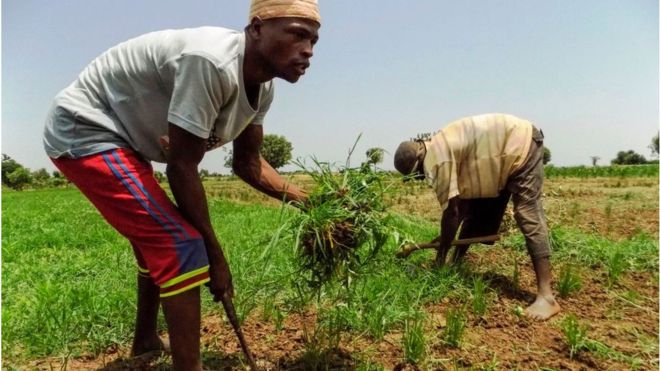By Abba Hamisu Sani
Africa-Press-Nigeria Rice is one of the most consumed staples in Nigeria; it’s estimated that Nigerians consume more than five million metric tons of rice each year. In recent decades, insufficient local rice production has emerged as a significant food security issue. A historically weak agricultural sector paired with a growing population means Nigeria relies heavily on rice imports to meet a growing demand.
Several strategies have sought to boost local production, increase food security and diversify Nigeria’s economy, with mixed results. For example, in 2015 the Central Bank of Nigeria blocked the use of foreign exchange to import dozens of items, including rice, which caused prices to skyrocket as local farmers struggled to meet demand. Domestic rice production has increased since then, however, historical lack of investment in agriculture has led to low productivity, and local farmers struggle to compete with much cheaper imported rice.
This challenge has been exacerbated by Covid-19 as the pandemic has severely disrupted imports, causing provisions to diminish and rice prices to increase. In addition, the sharp decline in oil prices as a result of the pandemic has reinforced the importance of import substitution and diversifying Nigeria’s economy away from oil.
To help strengthen Nigeria’s agricultural sector, in 2017 CDC committed $15 million to Sahel Capital’s Fund for Agricultural Finance in Nigeria (FAFIN). FAFIN backs sustainable businesses that seek to revolutionise the Nigerian agribusiness landscape while creating jobs, improving productivity, and strengthening supply chains. One such business is Coscharis Farms, an integrated rice processor in Nigeria with nearly 2,500 hectares of land for rice cultivation.
Coscharis Farms has a modernised approach to large-scale farming with potential to improve rice yields and introduce innovations and efficiencies into the value chain.
Insight study, on the impact of modern rice farming in Nigeria
Eplores the impact of the Coscharis Farms model and how the business contributes to food security and employment generation in Nigeria. Conducted by 60 Decibels and CDC, in partnership with FAFIN and Coscharis Farms, the study draws on interviews with more than 60 of its employees and contractors.

President Rice Farmers Association of Nigeria – RIFAN
Aminu Muhammad Goronyo President Rice farmers Association of Nigeria RIFAN is of the view that research supports the notion that modern large-scale farming focusing on staple crops is a viable solution to improve crop productivity and to help address food insecurity. We identify some potential opportunities to build impact further based on the study findings, by enhancing training opportunities, improving community relations, and enhancing communication across the organisation.
Review
Rice is one of the most consumed staples in Nigeria; it’s estimated that Nigerians consume more than five million metric tons of rice each year. In recent decades, insufficient local rice production has emerged as a significant food security issue. A historically weak agricultural sector paired with a growing population means Nigeria relies heavily on rice imports to meet a growing demand.
Several strategies have sought to boost local production, increase food security and diversify Nigeria’s economy, with mixed results. For example, in 2015 the Central Bank of Nigeria blocked the use of foreign exchange to import dozens of items, including rice, which caused prices to skyrocket as local farmers struggled to meet demand. Domestic rice production has increased since then, however, historical lack of investment in agriculture has led to low productivity, and local farmers struggle to compete with much cheaper imported rice.
This challenge has been exacerbated by Covid-19 as the pandemic has severely disrupted imports, causing provisions to diminish and rice prices to increase. In addition, the sharp decline in oil prices as a result of the pandemic has reinforced the importance of import substitution and diversifying Nigeria’s economy away from oil.
To help strengthen Nigeria’s agricultural sector, in 2017 CDC committed $15 million to Sahel Capital’s Fund for Agricultural Finance in Nigeria (FAFIN). FAFIN backs sustainable businesses that seek to revolutionize the Nigerian agribusiness landscape while creating jobs, improving productivity, and strengthening supply chains. One such business is Coscharis Farms, an integrated rice processor in Nigeria with nearly 2,500 hectares of land for rice cultivation.







